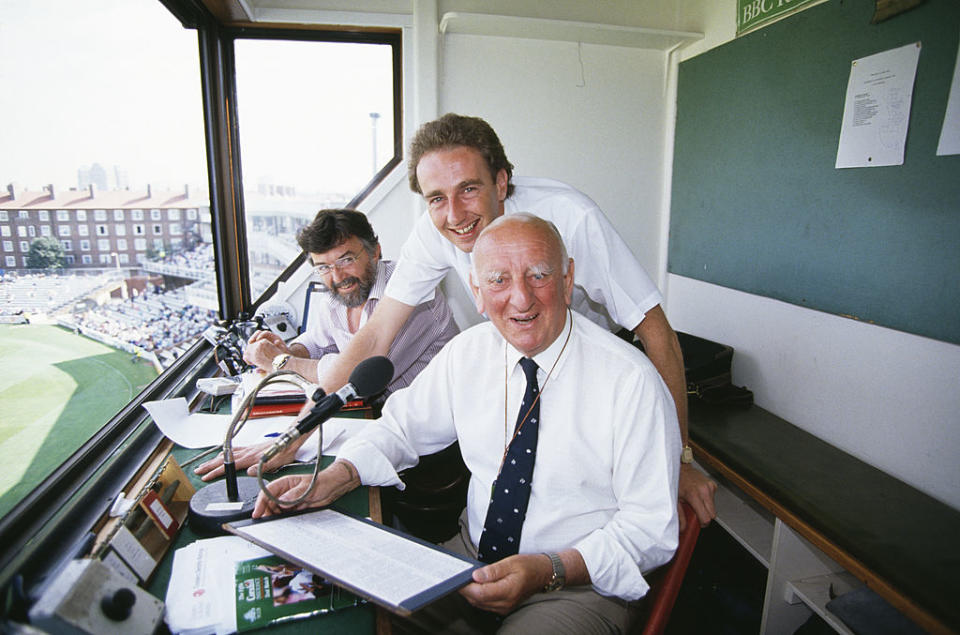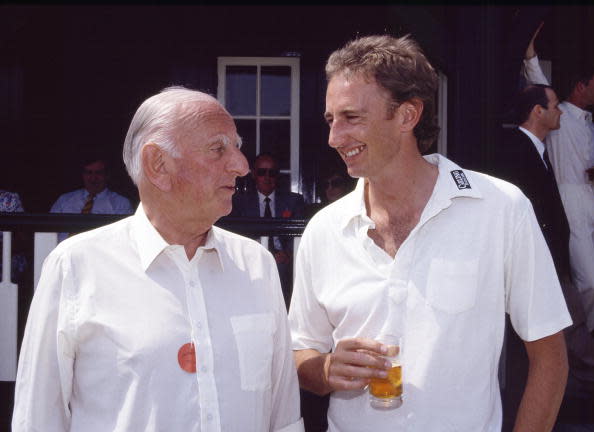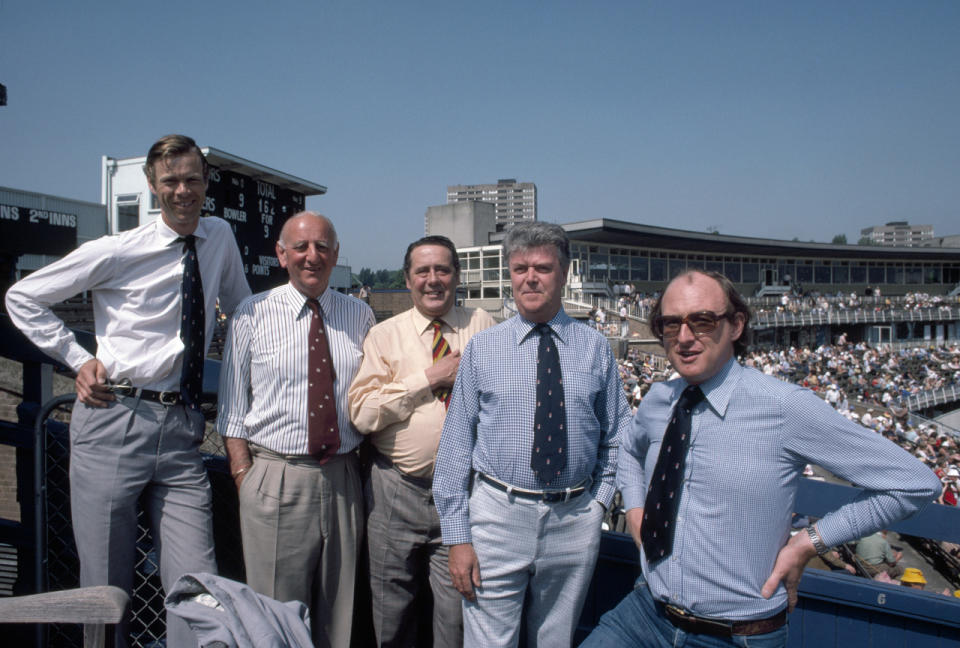Voices of Sport: Brian Johnston - The cricket commentator that helped to make Test Match Special an institution
In our weekly series, Yahoo Sport’s Nick Metcalfe features a famous voice of sport. As we come towards the end of another English cricketing summer, the great BBC commentator Brian Johnston goes under the spotlight.

Brian Johnston was one of the truly great voices of English summers.
It’s a voice that can transport you in an instant to long cricketing days of yore and a host of memorable names, teams and matches.
Johnston’s love of cricket was lifelong. He was a very useful club player as a youngster, particularly impressing as a wicketkeeper.
His career in broadcasting lasted for generations. Following military service during the Second World War, Johnston joined the BBC at the start of 1946.
His first Test match was England against India in the summer of 1946, where he worked for BBC Television. From the beginning, cricket commentary would define his life’s work. He became a regular with the BBC TV team, and was named as the corporation’s cricket correspondent in 1963.
It’s a job with a certain cachet. To try and put it in some context there have only been three in the past half century - Johnston, Christopher Martin-Jenkins and Jonathan Agnew.
Such was Johnston’s command of describing live events that he worked on the BBC Radio team for coverage of major national occasions, like the funeral of King George VI in 1952 and the Coronation of Queen Elizabeth II in 1953.
He also occasionally presented some other BBC favourites of the time, like Come Dancing. Viewers and listeners were becoming very familiar with the well spoken authoritative Englishman.
Cricket always came first however. When England beat old rivals Australia in the final Test of the 1953 series at The Oval, to clinch a 1-0 series win, he found simple words that stuck in the memory.
“Is it the Ashes? Yes. England have won the Ashes.”

His early years in broadcasting were dominated by television, but from 1965 Johnston split his cricket summers between TV and radio.
In a five match series, he tended to cover three games for TV and two for radio, on the popular Test Match Special. But when he was dropped from the TV commentary team in 1970 - much to his disappointment - he focused on one medium and it was to the benefit of radio lovers everywhere.
In many ways, Johnston was the person that represented the character and eccentricity of Test Match Special more than anyone else. It became a more colourful, more enjoyable programme, with him permanently on board.
He relished the opportunity to broadcast to the nation for hours and days at a time, and it was simply a pleasure to listen to him. Even those that have no interest in cricket were often tempted to tune in because Johnston was broadcasting to them.
Trueman and Boycott, Richards and Marshall, Lillee and Thompson. Special players and classic matches were described so expertly by the the man known in the commentary box and far beyond as “Johnners”.
Typically, it was eternal schoolboy Johnston that was responsible for a number of the nicknames we came to treasure - “Blowers” for Henry Blofeld, the “Bearded Wonder” or “Bearders” for scorer Bill Frindall, and much later “Aggers” for Agnew.
In the below picture, five members of the Test Match Special team are pictured at Edgbaston in 1978 - Martin-Jenkins, Johnston, Trevor Bailey, Don Mosey and Blofeld.

Johnston’s warm, well spoken tones accompanied the rhythms of the summer game so perfectly. He could talk about nearly anything - and very often did - but not to the detriment of what was happening out in the middle, which always took top billing. He proved to be the idea foil for John Arlott, the legendary TMS regular who I’ll be profiling later this year.
Johnston had a wonderful childlike humour, and often loved to wind up his colleagues. You always had the idea that as a listener you were somehow a friend of his, very much part of the conversation.
When Johnston once complained during the tea interval that he missed his cake, listeners started sending them in. It became a tradition that lasts to this current day.
The infamous line, “the bowler’s Holding, the batsman’s Willey” has never been heard on tape, but Johnston claimed to have received a letter from a listener suggesting he did say it.
Throughout the 1970s and 1980s, Johnston was also host of the popular Radio 4 programme “Down Your Way”, where he visited towns around the country, meeting local characters and hearing about their favourite music.
But TMS was his true broadcasting home. If it was long summers days, it meant the radio, and Johnston talking about our timeless game. He summed up the programme perfectly himself, describing it as “just a bunch of friends going to a Test match and talking about it”.
In the summer of 1991 came arguably the most memorable Test Match Special moment of all time. Ironically it was one Johnston disliked immensely at first.
He was discussing a day’s play between England and the West Indies in the fifth Test at The Oval with Agnew, who was in the first year of his long stint as the BBC’s cricket correspondent. You will know the rest. Many of you will know it pretty much off by heart in fact.
There are stories of listeners that pulled over to the hard shoulder of the motorway while listening to their car radios that evening, crying with laughter. Even now I’ll be amazed if the clip doesn’t make you giggle. It’s just so infectious and appeals so gloriously to the child in all of us.
As I mentioned, Johnston was furious with himself at first, thinking he was very unprofessional. It was only the day after that he began to come round to the moment. Listeners were responding in droves - they simply loved what they had heard. It became an instant radio classic.
Nearly everybody remembers that, but there’s a chance you may not have seen this fabulous piece of video from 1993 featuring Agnew, Fred Trueman and Jack Bannister. Johnston wasn’t on screen, but he was very much the man behind it.
In the autumn of 1993 Johnston went on a tour of the country’s theatres, entertaining live audiences with a special show. But he had a heart attack late that year, and died at the start of 1994 at the age of 81.
Prime Minister John Major said: “Summers simply won’t be the same without him.” More than 2,000 people attended a special memorial service at Westminster Abbey.
I’m going to leave the final say to Martin-Jenkins, another of cricket’s great voices that we miss so much.
“So much fun was given to so many people for so long by this devoted family man of high principles. Brian Johnston was a great Englishman, a unique broadcaster and a born entertainer.”


